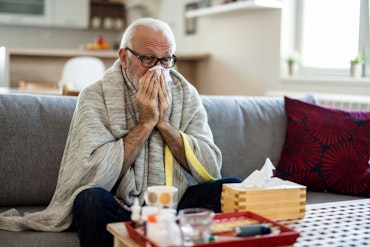Emergency leave available for aged care residents
The Government adopted new emergency leave legislation amendments this week, which allows for older residents to move out of their aged care during a crisis, like the COVID-19 pandemic, without being penalised.
![<p>Older Australians who left aged care from 1 April this year will be eligible for emergency leave. [Source: Shutterstock]</p>](https://agedcareguide-assets.imgix.net/news/articles/shutterstock_208545922.jpg?fm=pjpg&format=auto&w=550&q=65)
Older Australians who left aged care from 1 April this year will be eligible for emergency leave. [Source: Shutterstock]
This emergency leave mechanism will only be activated and available in crisis situations, like natural disasters or health epidemics.
Older Australians who left aged care from 1 April this year will be eligible for emergency leave, so residents who moved out of their facility earlier in the year because of COVID-19 are not at a disadvantage.
Minister for Aged Care and Senior Australians, Richard Colbeck, says the culmination of bushfires last year and the current pandemic has put a spotlight on leave entitlements during a crisis for aged care residents.
“During the COVID-19 pandemic, some aged care residents have temporarily relocated to live with family, to reduce their risk of exposure to the virus,” says Minister Colbeck.
“Most of these residents are likely to exhaust their 52 days before the pandemic passes, leading to extra costs on them or their families.
“The Government recognises that this isn’t fair or desirable. We have amended the Aged Care Act to give aged care residents the option of taking additional leave during an emergency.”
Under the current legislation, residents are able to take up to 52 days in a year for non-hospital related social leave, or for other reasons.
However, if a resident takes more than 52 days social leave, the Government will not provide a subsidy to the aged care home for the individual who has taken extra days.
Usually, this cost is passed on to the resident, but this new emergency leave will protect older residents who feel safer outside of their facility.
The Government will continue to pay the residential care subsidy for residents on emergency leave so that the resident and the provider are both not left at a financial disadvantage, explains Minister Colbeck.
Additionally, this emergency leave is available for specific regions that are in crisis. For instance, if there is an isolated COVID-19 outbreak or in major bushfire affected areas.
Minister Colbeck says, “This initiative will allow permanent aged care residents and their families to make their own decisions about personal safety in emergency situations, without suffering financially as a result.
“It also means that after an emergency, residents can use their social leave entitlement for normal visiting and special events with their families and friends, which are so important for emotional and mental health.”
While this new emergency leave is available to residents worried in aged care facilities, the industry has been very open about the fact that residential aged care and home care services are safe to receive, and is vital for some older people who have difficult care needs.
For more information about the coronavirus, visit the Aged Care Guide COVID-19 update page.
Do you have any questions about the coronavirus that you want answered? Tell us in the comments below or email journalist@dps.com.au.











![The new Aged Care Act exposure draft is slated for release in December of 2023, but advocates hope to see it rolled out on January 1, 2024. [Source: Shutterstock]](https://agedcareguide-assets.imgix.net/news/articles/wp/agedcareact__0811.jpg?fm=pjpg&w=520&format=auto&q=65)












Comments